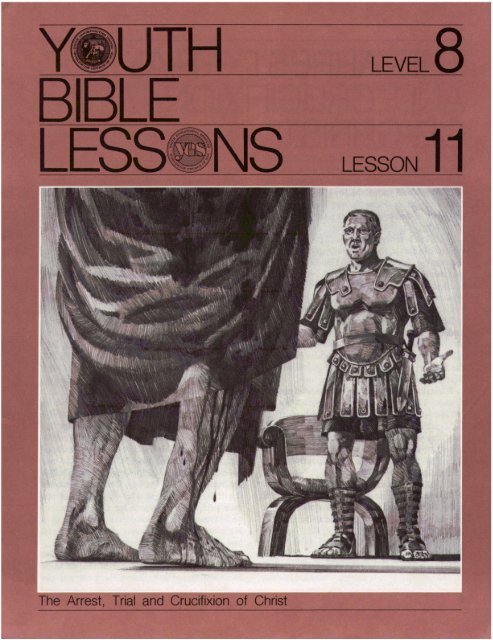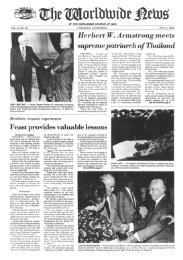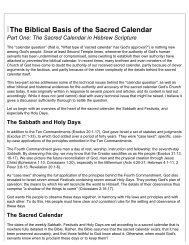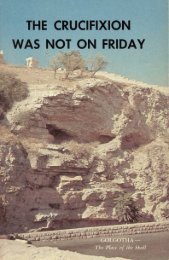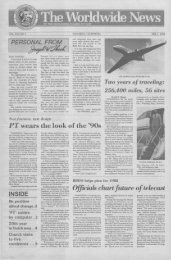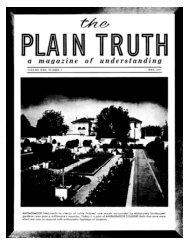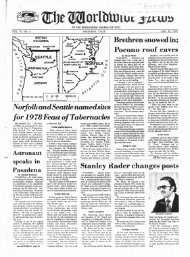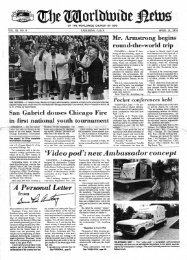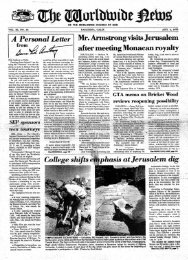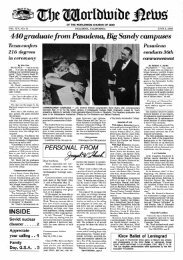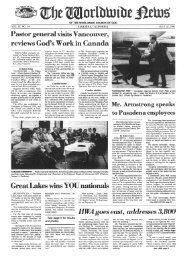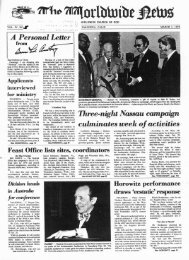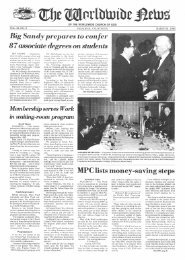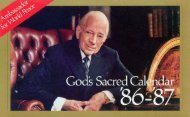Lesson 11 - Herbert W. Armstrong Library and Archives
Lesson 11 - Herbert W. Armstrong Library and Archives
Lesson 11 - Herbert W. Armstrong Library and Archives
Create successful ePaper yourself
Turn your PDF publications into a flip-book with our unique Google optimized e-Paper software.
The Arrest, Trial <strong>and</strong> Crucifixion of Christ
THE ARREST, TRIAL<br />
AND CRUCIFIXION<br />
OF CHRIST<br />
A fter concluding the Passover, Jesus Christ<br />
M. <strong>and</strong> His disciples crossed over the Kidron<br />
brook <strong>and</strong> on to the lower slopes of the<br />
Mount of Olives. Here He would have the last<br />
moments of peace <strong>and</strong> privacy in prayer with<br />
His Father.<br />
Jesus knew how vital it was that He be close<br />
to His Father before the traumatic events of<br />
the coming day. He wanted His Father's support<br />
<strong>and</strong> inspiration to help Him with the<br />
terrible ordeal He faced.<br />
STAYING CLOSE TO GOD<br />
Whenever we are about to face difficult situations,<br />
or find ourselves in trying circumstances,<br />
it is important that we have a close<br />
relationship with God. We should draw upon<br />
the support, encouragement <strong>and</strong> guidance that<br />
God can give us at such times.<br />
What does God promise to those who remain<br />
close to Him?<br />
"Let your conversation [conduct] be without<br />
_____; <strong>and</strong> be<br />
with such<br />
things as ye have: for he hath said, I will never<br />
____ thee, nor<br />
thee. So that<br />
we may boldly say, The Lord is my<br />
_____, <strong>and</strong> I will not<br />
what<br />
___ shall do unto me" (Hebrews 13:5-6).<br />
It doesn't matter how great or how small the<br />
difficulty may be, God is always available to<br />
help us with our needs <strong>and</strong> listen to our prayers<br />
ABOUT OUR COVER . ..<br />
Pontius Pilate, the Roman governor of Judea, sentenced<br />
Christ to scourging <strong>and</strong> crucifixion.<br />
2<br />
Illustration by Ken Tunell<br />
for help. Perhaps we face a difficult examination<br />
at school or problems in our relationship<br />
with our family. Possibly the influence of our<br />
peers at school seems too much to cope with.<br />
Whatever the situation, God will hear us when<br />
we ask Him for help.<br />
CHRIST PRAYS TO THE FATHER<br />
After arriving at the Garden of Gethsemane,<br />
Christ told His disciples to wait while He went<br />
to pray. Taking Peter, James <strong>and</strong> John with<br />
Him, He began to pour out His feelings to<br />
them.<br />
Remember, Christ was also a human being.<br />
He had led a perfect, sinless life having had<br />
God's Holy Spirit from birth, but He still<br />
suffered just as you <strong>and</strong> I do (Mark 14:33-34).<br />
"Seeing then that we have a great high<br />
_____, that is passed into the heavens,<br />
the Son of God, let us<br />
our profession. For we have not an<br />
which cannot be<br />
with the ____<br />
firmities; but was in<br />
like as we are,<br />
__" (Hebrews 4:14-15).<br />
of our inpoints<br />
yet without<br />
Jesus Christ was tempted just as we are, but<br />
He did not sin. This is why Christ underst<strong>and</strong>s<br />
the trials <strong>and</strong> problems we experience as human<br />
beings. It is no wonder that Christ was<br />
"sore troubled" <strong>and</strong> "exceedingly sorrowful" as<br />
He contemplated the events of His arrest, trial<br />
<strong>and</strong> crucifixion.<br />
Christ knew the terrible death He faced. He<br />
knew He would carry the sins of the world on<br />
His shoulders. Christ knew He must pay the<br />
Youth Bible <strong>Lesson</strong>
death penalty for the breaking of God's laws on as before. Suffering from physical <strong>and</strong> nervous<br />
behalf of all who would later be given the exhaustion, the disciples again fell asleep.<br />
opportunity for eternal life.<br />
When Christ returned the second time, they<br />
With all these events on His mind, Jesus were embarrassed <strong>and</strong> afraid <strong>and</strong> could offer no<br />
prayed to His Father. He asked that if it were excuse (Mark 14:39-40).<br />
possible, could there be another way that God's A third time, Christ prayed in great mental<br />
purpose of salvation be achieved. But Jesus anguish that God would take away the aweconcluded<br />
His prayer with the recognition that some trial that faced Him. But being subject to<br />
all things must be done according to the Fa- God's will, He understood God's purpose <strong>and</strong><br />
ther's will.<br />
accepted what was about to happen to Him.<br />
We often make our requests to God in Returning to His disciples, He woke them <strong>and</strong><br />
prayer as Christ did, only to become upset told them that the time of His betrayal <strong>and</strong> arrest<br />
when our prayers are not r-::============. had come. Christ was now<br />
answered exactly in the way Suffering from physlcsl <strong>and</strong> prepared to face His ordeal<br />
we asked. We must under- nervous exhaustion, the (Matthew 26:46).<br />
st<strong>and</strong>, as Christ did, that disciples sgsln fellssleep.<br />
God's decisions <strong>and</strong> ways When Christ returned . ..<br />
JUDAS THE BETRAYER<br />
are perfect. Too often we<br />
judge situations according<br />
they were emba"s .. ed<br />
to our own reasoning. We <strong>and</strong> afrsld ...<br />
decide what is fair <strong>and</strong> just<br />
according to man's way. But God judges perfectly.<br />
And sometimes His decisions are not the<br />
decisions we would make.<br />
"For my<br />
are not your<br />
____, neither are your<br />
my<br />
____,' saith the . For as the heavens<br />
are<br />
than the earth, so are my<br />
____ higher than your , <strong>and</strong> my<br />
than your<br />
" (Isaiah<br />
55:8-9).<br />
We should always seek to underst<strong>and</strong> God's<br />
will <strong>and</strong> to underst<strong>and</strong> why God does what He<br />
does. When a person receives God's Holy<br />
Spirit, he begins to think as God does. He or<br />
she begins to underst<strong>and</strong> God's way. Because<br />
Jesus had the Holy Spirit from birth, He understood<br />
God's will <strong>and</strong> was willing to acknowledge<br />
that God's way is right.<br />
Christ was in such agony when he prayed,<br />
that His sweat became like drops of blood<br />
(Luke 22:44).<br />
When Christ returned to Peter, James <strong>and</strong><br />
John, He found them asleep. After encouraging<br />
them to pray <strong>and</strong> remain alert, He went back<br />
to continue praying. His prayer was the same<br />
Knowing that Jesus <strong>and</strong><br />
His disciples often came to<br />
the Garden of Gethsemane,<br />
Judas Iscariot led a b<strong>and</strong> of<br />
soldiers there to arrest Him. With them were<br />
officers of the chief priests <strong>and</strong> Pharisees. They<br />
carried lanterns <strong>and</strong> torches <strong>and</strong> their weapons<br />
(John 18:2-3).<br />
Judas, the betrayer, planned to identify Jesus<br />
to the soldiers with a kiss of greeting (Matthew<br />
26:48-49). As the soldiers approached, Christ<br />
asked them who they were looking for. The<br />
guards making the arrest then answered, "Jesus<br />
of Nazareth." When Jesus replied to the<br />
men, the guards <strong>and</strong> officers of the priests <strong>and</strong><br />
Pharisees fell backward to the ground.<br />
A second time they said they had come for<br />
Jesus of Nazareth <strong>and</strong> moved forward to make<br />
the arrest. At that moment, Peter drew his<br />
sword <strong>and</strong> struck a servant of the high priest,<br />
cutting off his ear. Christ sternly rebuked Peter<br />
by saying that violent men suffered violent<br />
deaths. Jesus then healed the servant's ear<br />
(Matthew 26:51-52; Luke 22:48-51).<br />
Jesus told Peter that if He had wanted to<br />
resist arrest, He could have called on thous<strong>and</strong>s<br />
of angels to come to His aid. Instead, Jesus<br />
knew that it was God's will that He go through<br />
with the arrest.<br />
Level 8 I <strong>Lesson</strong> <strong>11</strong><br />
3
The soldiers grabbed Christ <strong>and</strong> bound Him<br />
in ropes. Christ questioned their actions in<br />
making this arrest at night in a quiet, secluded<br />
place. He asked them why they hadn't arrested<br />
Him when He taught in the Temple or walked<br />
through the streets.<br />
At the moment of Christ's arrest, the fainthearted<br />
disciples all fled . No one remained to<br />
support Him. One young man was so desperate<br />
to escape that when the soldiers grabbed his<br />
clothing, he tore himself free <strong>and</strong> ran naked<br />
from the garden. It is possible that this young<br />
man was Mark, who later wrote of this incident<br />
in the book of Mark (Mark 14:50-52).<br />
The disciples had been with Christ for three<br />
4<br />
<strong>and</strong> one-half years. They had seen many fantastic<br />
miracles. They had watched how Christ<br />
reacted to many different situations. They<br />
heard Him teach with authority <strong>and</strong> explain the<br />
true meaning of the Scriptures-not twisting<br />
the Scriptures to suit His own will as the<br />
Pharisees did. Even Peter had told Christ that<br />
he knew there was no other way to live except<br />
to follow His example (John 6:68).<br />
But when they were tested, the disciples,<br />
without God's Spirit, were unable to hold to<br />
their convictions. In spite of all that they knew<br />
to be true, they didn't have the character to<br />
st<strong>and</strong> for what they believed.<br />
We can look to the end of these disciples'<br />
Youth Bible <strong>Lesson</strong>
The view looking across the Kidron Valley in<br />
Jerusalem. with the Garden of Gethsemane where<br />
Christ was arrested in the foreground.<br />
lives to see that they did develop that character.<br />
After they received God's Spirit on the day of<br />
Pentecost in A.D. 31, dramatic changes took<br />
place in their lives. They began to teach with<br />
power <strong>and</strong> authority what Christ had told them<br />
to teach, the Gospel of the Kingdom of God.<br />
AN ILLEGAL TRIAL<br />
From the Garden of Gethsemane, Christ was<br />
taken to the house of Annas, the father-in-law<br />
of the high priest. Annas was an influential<br />
man among the Jewish religious leaders. He<br />
Level 6 I <strong>Lesson</strong> <strong>11</strong><br />
Q)<br />
.~<br />
Q)<br />
(fJ<br />
~<br />
c:<br />
g<br />
~<br />
had previously been high priest before being<br />
deposed by the Romans in A.D. 15. In A.D.<br />
18, Caiaphas became high priest, but Annas<br />
remained a respected religious leader among<br />
the Jews. Both Annas <strong>and</strong> Caiaphas were often<br />
regarded as high priests (Luke 3:2).<br />
Annas was an older man <strong>and</strong> well versed in<br />
the Jewish law. He was concerned about his<br />
role in the community if the message of the<br />
Kingdom of God were to be believed by the<br />
multitudes.<br />
Annas questioned Jesus about His teachings<br />
<strong>and</strong> His disciples (John 18:19). Christ's reply<br />
was that He had never hidden anything, but<br />
had preached openly in the synagogues <strong>and</strong> in<br />
the Temple.<br />
"Why then," Jesus asked, "didn't you question<br />
those who heard Me teach?"<br />
Angered at Christ's reply, a guard struck<br />
Christ. This was the beginning of the physical<br />
abuse that would eventually culminate in<br />
Christ's crucifixion. Jesus was then taken to<br />
Caiaphas' house where He was to be tried.<br />
Caiaphas quickly convened an investigative<br />
council. The council members came from the<br />
influential people of Judea-priests, lawyers,<br />
Sadducees <strong>and</strong> Pharisees.<br />
The council could make charges in civil <strong>and</strong><br />
religious matters in Judea. But under Roman<br />
rule, they could not deal with acts of treason or<br />
disloyalty to Roman leadership.<br />
Witnesses were bribed to appear <strong>and</strong> make<br />
false accusations against Christ. But none of<br />
the men making the charges agreed with each<br />
other. Then two men came forward <strong>and</strong> falsely<br />
claimed that Jesus had boasted of destroying<br />
the Temple <strong>and</strong> rebuilding it in three days. But<br />
even these two witnesses could not agree on<br />
their story. They were also twisting the meaning<br />
of what Christ had said (Mark 14:55-59).<br />
Christ had been referring to the "temple" of<br />
His body (John 2:18-21). The Apostle Paul<br />
also referred to the body of a converted Christian<br />
as a temple.<br />
Why is it called a temple?<br />
"Know ye not that ye are the<br />
of<br />
5
___, <strong>and</strong> that the<br />
of God from a distance to Caiaphas' house. Because<br />
dwelleth in you?" (I Corinthians 3:16.)<br />
The only sign Christ gave to the disbelieving<br />
Jews that He was the Messiah was that He<br />
would be in the grave three days <strong>and</strong> three<br />
nights. He would be buried <strong>and</strong> His body, the<br />
temple of God's Spirit, would be raised three<br />
days later.<br />
Christ gave no defense to the false accusations<br />
<strong>and</strong> lies directed at Him. To have done so<br />
would have been useless in this unjust court<br />
(Mark 14:61).<br />
Finally, Caiaphas asked Jesus if He was the<br />
Christ, the Son of God. Christ replied: "Thou<br />
hast said: nevertheless I say unto you, Hereafter<br />
shall ye see the Son of man sitting on the<br />
right h<strong>and</strong> of power, <strong>and</strong> coming in the clouds<br />
of heaven" (Matthew 26:64).<br />
This was too much for the self-righteous<br />
John was known to someone in Caiaphas'<br />
household, they were allowed into the courtyard<br />
(John 18:15-16).<br />
When they entered the gateway, a maid<br />
questioned if Peter was one of Christ's disciples.<br />
Peter promptly denied that he knew anything<br />
about Christ. He then walked to a brazier<br />
filled with hot coals where several officers of<br />
the guard were warming themselves. As Peter<br />
stood warming his h<strong>and</strong>s, he was again asked if<br />
he was one of Christ's disciples. Again, he<br />
denied any knowledge of Christ.<br />
Then one of the household servants of the<br />
high priest, a relative of the man whose ear<br />
Peter had cut off, was sure that he had seen<br />
Peter with Jesus in the Garden of Gethsemane<br />
(John 18:26).<br />
What was Peter's reaction to this third accureligious<br />
leaders. In a ceremonial display of sation?<br />
indignation, Caiaphas tore the hem of his gar- "Then began he to <strong>and</strong> to<br />
ment, loudly accusing Christ of blasphemy-<br />
, saying, I<br />
not the<br />
claiming to be God. man" (Matthew 26:74).<br />
According to the law (Leviticus 24: 16), a At that moment, a rooster crowed, signaling<br />
"blasphemer" was to be stoned to death. In the dawn of a new day. Then Christ turned <strong>and</strong><br />
their hatred against Christ, these men may now looked at Peter. Suddenly, Peter remembered<br />
have felt justified in their .. ============-1 that Christ had told him<br />
predetermined decision to Christ gave no defense to that he would deny Him<br />
kill Him.<br />
the false accusations <strong>and</strong> three times.<br />
These highly regarded religious<br />
leaders now began to<br />
went out <strong>and</strong> wept bitterly<br />
Filled with grief, Peter<br />
lies directed at Him. To<br />
take out their spite <strong>and</strong> hatred have done so would have ~ (Matthew 26:75).<br />
on Christ. They struck Him been useless In this unjust<br />
with their h<strong>and</strong>s <strong>and</strong> spit in<br />
court.<br />
His face.<br />
As they struck Him, they began to taunt<br />
Him <strong>and</strong> call on Him to prophesy. They covered<br />
His face with a hood or blindfold <strong>and</strong><br />
mocked Him to identify those who struck Him.<br />
This violent, cowardly treatment of Jesus<br />
continued through the early hours of the morning.<br />
PETER DENIES CHRIST<br />
During this time, Peter <strong>and</strong> another disciple,<br />
probably John, followed the arresting mob<br />
JESUS IS CONDEMNED<br />
TO DEATH<br />
Jesus Christ was subjected to false charges,<br />
insults <strong>and</strong> severe physical abuse. At dawn He<br />
was again before a council of religious leaders.<br />
He was again questioned as to whether He was<br />
the Christ, the Son of God.<br />
What was Christ's reply?<br />
"If I tell you, ye will not<br />
: <strong>and</strong> if<br />
I also ask you, ye will not answer me, nor<br />
__________. Hereafter shall the<br />
____ of ______ on the ____<br />
____ of the power of . Then said<br />
6<br />
Youth Bible <strong>Lesson</strong>
they all, Art thou then the Son of God? And<br />
he said unto them, Ye<br />
that __<br />
__" (Luke 22:67-70).<br />
As far as the members of the council were<br />
concerned, Jesus was now condemned by His<br />
own words.<br />
Do You Remember?<br />
1. Why is it important for us to have a close<br />
relationship with God? ______ _<br />
2. God has promised us<br />
that He would never<br />
_____ us.<br />
3. What did the disciples<br />
do while Jesus prayed?<br />
Christ was next taken be-<br />
fore the procurator, Pontius<br />
Pilate. Pilate was the Roman governor of<br />
Judea. He had been appointed to the office in<br />
A.D. 26 possessing military <strong>and</strong> financial powers.<br />
He appointed the high priest <strong>and</strong> controlled<br />
the Temple funds. The Roman historian<br />
Philo describes Pilate as a harsh <strong>and</strong> spiteful<br />
man (Matthew 27:2).<br />
Pilate was continually trying to keep the<br />
Roman emperor happy, <strong>and</strong> at the same time<br />
rule a nation of people he hated <strong>and</strong> misunderstood.<br />
He particularly hated the self-righteous,<br />
vindictive religious leaders of the Jews, <strong>and</strong><br />
they had the same feelings toward him.<br />
Christ was taken to Pilate's palace. St<strong>and</strong>ing<br />
outside, as they feared becoming defiled by entering<br />
a Gentile's house, the Jews accused Jesus<br />
of many things. They wanted Christ tried <strong>and</strong><br />
executed by the Roman authorities. To make this<br />
possible, they used other false charges. These<br />
things helped fulfill Christ's prophecy of how He<br />
would be killed-by Roman crucifixion, not<br />
stoning (Luke 23:1; John 18:28-29).<br />
"And they began to accuse him, saying, We<br />
4. Should we be angry at<br />
God if He does not answer<br />
our prayers exactly as we asked?<br />
Why? ______________________<br />
5. We should always seek to underst<strong>and</strong><br />
God's ____ _<br />
6. Christ prayed while in the Garden of<br />
7. ____________ betrayed<br />
Christ.<br />
8. Which disciple cut off the ear of the high<br />
priest's servant? ______<br />
9. What did the disciples do when Christ was<br />
arrested? _____________<br />
10. Who was the high priest? ____ _<br />
<strong>11</strong>. Who was the father-in-law of the high<br />
priest? ____ _<br />
12. Peter denied Christ ____ times.<br />
THE BETRAYER'S END<br />
When Judas Iscariot, who was st<strong>and</strong>ing on<br />
the fringes of the crowd, heard the condemnation<br />
of Christ, he understood its meaning. He<br />
understood that the religious leaders would not<br />
Pllst. w •• contlnuslly<br />
trying to keep the ROtIIIIn<br />
."",.,01 hllppy, IIIJd .t<br />
the .. ",. time, rule. nstIon<br />
of people h. IuIted snd<br />
misunderstood.<br />
rest that day until Christ was dead. He further<br />
realized that it was his actions that resulted in<br />
Christ's arrest.<br />
Judas returned the pieces of silver, his price<br />
for betraying Christ, to the chief priests. They<br />
refused it, self-righteously declaring it tainted<br />
with blood (Matthew 27:3-10).<br />
After throwing the money down in the Temple,<br />
Judas ran out <strong>and</strong> hastily made a noose out<br />
of old rope, tied it to a tree <strong>and</strong> placed it<br />
around his neck. Unable to bear the guilt,<br />
Judas leaped out <strong>and</strong> ended his life. As Judas<br />
hung from the tree, the rope<br />
broke <strong>and</strong> his body fell to<br />
the ground, bursting his<br />
stomach (Acts 1: 18-19).<br />
JESUS BROUGHT<br />
BEFORE PILATE<br />
found this fellow<br />
forbidding to give<br />
the nation, <strong>and</strong><br />
to ______<br />
Level 8 I <strong>Lesson</strong> <strong>11</strong><br />
7
saying that he himself is Christ a ____ "<br />
(Luke 23:2).<br />
They implied that Christ was plotting<br />
against Caesar. This was treason, a crime by<br />
Roman law <strong>and</strong> punishable by death.<br />
Pilate would have known about Christ, who<br />
had received much attention in Jerusalem because<br />
of His miracles <strong>and</strong> teachings. But seeing<br />
no harm in Christ's teachings, he told the<br />
Jewish leaders to try Christ <strong>and</strong> judge Him<br />
according to their law (John 18:31).<br />
Realizing that their purpose was beginning<br />
to be thwarted, they loudly proclaimed that<br />
they could not pronounce the death sentence<br />
for treason, saying that it was Pilate's responsibility.<br />
Pilate did not want them accusing him<br />
to Caesar of allowing sedition in Judea. So he<br />
reluctantly agreed to question Christ.<br />
Pilate asked Christ if He claimed to be the<br />
king of the Jews. "Is that what you think or did<br />
someone tell you about Me?" Christ asked<br />
him. Pilate quickly assured Christ that it was<br />
the Jew's accusation (John 18:33-35).<br />
Christ then explained that He was indeed a<br />
king <strong>and</strong> was born for that purpose. But, His<br />
kingdom was not of this world (age). Therefore,<br />
His followers did not fight. Christ's purpose<br />
in being born was to bring the knowledge<br />
of the truth to those whom God would call.<br />
Cynically, Pilate asked, "What is truth?"<br />
(John 18:38.)<br />
The Bible answers this question for us. "Thy<br />
____ is truth" (John 17:17).<br />
Satisfied that Christ presented no threat to<br />
Roman rule, Pilate told the Jewish religious<br />
leaders that he considered Christ innocent.<br />
But the religious leaders continued their accusations<br />
against Christ. Pilate was astonished<br />
that Christ remained silent, not answering their<br />
accusations as most people would have done<br />
(Matthew 27:13-14).<br />
The priests <strong>and</strong> elders then turned their accusations<br />
to Pilate, again claiming Christ was<br />
guilty of treason. "He's preached sedition from<br />
Galilee to Judea," they shouted.<br />
Hearing that Jesus was from Galilee gave<br />
8<br />
Pilate the idea of sending Him to Herod.<br />
Herod Antipas was the tetrarch <strong>and</strong> ruler over<br />
the area of Galilee.<br />
Herod, who happened to be in Jerusalem at<br />
this time, was delighted to see Jesus. But not<br />
for any good reason. Having heard about<br />
Christ's miracles, he was hopeful that Jesus<br />
would perform one for him. He questioned<br />
Christ in detail, while the chief priests <strong>and</strong><br />
scribes stood by vehemently accusing Him. But<br />
Simon of Cyrene was required to carry the huge<br />
wooden stake to the site of Christ's crucifixion.<br />
Youth Bible lesson
Christ did not dignify their accusations by<br />
answering them.<br />
Angry at Christ's silence to his questions <strong>and</strong><br />
not seeing a miracle, Herod <strong>and</strong> his soldiers<br />
mocked Him. They dressed Christ in a royal<br />
robe <strong>and</strong> then sent Him back to Pilate (Luke<br />
23:6-12).<br />
BARABBAS IS RELEASED<br />
As a gesture of "generosity" toward the<br />
Jewish people, it was Pilate's custom during the<br />
Passover season to release a prisoner of their<br />
choice. Hoping to be rid of<br />
Christ, he offered them the<br />
choice of Barabbas, a convicted<br />
terrorist <strong>and</strong> murderer,<br />
or Jesus Christ.<br />
The Jewish leaders persuaded<br />
the crowd to dem<strong>and</strong><br />
the release of Barabbas.<br />
When Pilate appeared on the<br />
balcony to ask which prisoner they wanted released,<br />
the angry mob, led by the hateful scribes<br />
<strong>and</strong> Pharisees, began to shout for Barabbas.<br />
Pilate told them that he could find no fault<br />
that made Jesus deserve crucifixion. By this<br />
time the Jewish leaders were beside themselves<br />
with hatred <strong>and</strong> fury.<br />
What did they say to Pilate?<br />
"If thou this go, thou art not<br />
____ friend: whosoever maketh himself<br />
a speaketh against "<br />
(John 19:12).<br />
Pilate realized that it was Christ's life or his<br />
loss of credibility with Caesar <strong>and</strong> possible<br />
death. Taking Christ down to the Roman judgment<br />
hall, he presented Christ to the religious<br />
leaders as the king of the Jews.<br />
"We have no king but Caesar," they shouted<br />
to Pilate (John 19:15).<br />
Pilate then ceremoniously washed his h<strong>and</strong>s,<br />
symbolizing that he did not consider himself<br />
responsible for Christ's death. He released<br />
Barabbas <strong>and</strong> formally sentenced Christ to the<br />
will of the religious leaders. Christ was then<br />
taken to be scourged before being crucified<br />
Pilate told them that he<br />
found no fault that made<br />
Jesus deserve crucifixion.<br />
The Jewish leaders were<br />
beside themselves with<br />
hatred <strong>and</strong> fury.<br />
(Matthew 27:23-26; Luke 23:24).<br />
THE ROMAN SCOURGING<br />
A Roman scourging was a terrible punishment<br />
which many never survived. The person<br />
was tied to a pillar or post <strong>and</strong> then lashed by<br />
a trained soldier. The whips were made of<br />
thongs of leather fastened to a h<strong>and</strong>le. There<br />
were usually three thongs in each scourge<br />
imbedded with bits of metal <strong>and</strong> bone. Christ<br />
was beaten so badly during this scourging, He<br />
was barely recognizable.<br />
What does Isaiah say<br />
about Christ's beaten body?<br />
"As many were astonied<br />
[astonished] at thee; his<br />
was so<br />
____ more than<br />
_______, <strong>and</strong> his<br />
form more than the ____<br />
of men" (Isaiah 52:14).<br />
This beating was a vital part in God's plan.<br />
Christ's shed blood <strong>and</strong> His broken body picture<br />
a complete <strong>and</strong> total sacrifice for sin.<br />
At the Passover service today, Christ's sacrifice<br />
is remembered through the symbols Christ<br />
established. A small glass of wine represents<br />
Christ's shed blood <strong>and</strong> a piece of unleavened<br />
bread represents His broken body. True Christians<br />
show appreciation that Christ's blood allows<br />
forgiveness of sin. But also, the broken<br />
bread shows our willingness to allow Christ to<br />
live His life in us.<br />
Another deep meaning of Jesus' sacrifice <strong>and</strong><br />
suffering is that with His<br />
we are<br />
____ (Isaiah 53:5 <strong>and</strong> I Peter 2:24).<br />
After the terrible scourging, the Roman soldiers<br />
draped a robe around Christ's battered<br />
<strong>and</strong> bleeding body. Then they took a wreath of<br />
thorns <strong>and</strong> jammed it down onto Christ's head,<br />
causing excruciating pain as the blood ran<br />
down His face.<br />
Then spitting on Him, mocking Him <strong>and</strong><br />
beating His head with a reed, they bowed down<br />
before Him, saluting Him as the king of the<br />
Jews (Matthew 27:27-30).<br />
Level 8 / <strong>Lesson</strong> <strong>11</strong><br />
9
The probable site of Golgotha, the "place of the skull," where the crucifixion of Christ occurred.<br />
CHRIST IS CRUCIFIED<br />
After their humiliating treatment of Christ,<br />
the soldiers led Him away to be crucified. He<br />
was so weak from the brutal scourging, they<br />
had to force a man named Simon of Cyrene to<br />
carry the huge wooden stake to the site of the<br />
crucifixion (Luke 23:26).<br />
A large crowd of people followed the procession<br />
outside the city.<br />
Some women who saw Jesus began weeping.<br />
When Christ saw them crying, He turned <strong>and</strong><br />
told them not to weep for Him, but for themselves<br />
as the destruction of Jerusalem would<br />
soon be upon them. It was about 40 years later<br />
that Jerusalem was destroyed by the Romans<br />
(Luke 23:27-31).<br />
Finally, the group of soldiers with Christ<br />
reached a small rocky outcropping called Golgotha,<br />
outside the wall of the city. Golgotha is<br />
10<br />
a word that means "place of the skull"<br />
(Matthew 27:33).<br />
There they stripped Him of His robe <strong>and</strong><br />
proceeded with the final part of Christ's death.<br />
They stretched Him out on the stake <strong>and</strong><br />
pounded crude iron nails into His h<strong>and</strong>s <strong>and</strong><br />
feet, fixing Him to the wooden stake. Nailed to<br />
the stake over Christ's head was an inscription<br />
in three languages-Hebrew, Greek <strong>and</strong><br />
Latin-that read, "This is Jesus of Nazareth,<br />
the king of the Jews." This was Pilate's final<br />
spiteful act to the Jewish religious leaders<br />
(John 19: 19-20).<br />
Jesus hung in agony on the stake while the<br />
chief priests <strong>and</strong> Pharisees came to mock <strong>and</strong><br />
insult Him. They challenged Him to save Himself<br />
from the cross if He could. They did not<br />
realize that Jesus could have called upon thous<strong>and</strong>s<br />
of angels to come to His rescue. But<br />
Christ knew He had to go through with this<br />
Youth Bible <strong>Lesson</strong>
terrible ordeal to make it possible for God to<br />
enlarge His Family (Matthew 27:39-43).<br />
Crucified on either side of Him were two<br />
thieves. One scorned Him <strong>and</strong> accused Him.<br />
The other knew that they both deserved their<br />
punishment, but Christ was innocent. The thief<br />
then asked Christ to remember him when He<br />
returned to His kingdom. Christ's reply was<br />
that later, after the resurrection of all the dead,<br />
the thief would indeed see Christ in His Kingdom<br />
(Luke 23:39-43).<br />
Among the mourners around the cross were<br />
Christ's mother Mary, <strong>and</strong> one of His disciples,<br />
John. Thinking of others, even in this time of<br />
pain <strong>and</strong> agony, Christ comm<strong>and</strong>ed John to<br />
look after His mother from that time forward<br />
(John 19:27).<br />
About midday, an unnatural darkness came<br />
over the l<strong>and</strong> of Judea. It lasted for about three<br />
hours. After this, Christ knew even His Father<br />
had turned His back on Him as He carried the<br />
world's sins on His shoulders. With a<br />
heartrending cry, Christ called out to His Father.<br />
"My , my , why hast thou<br />
_____ me?" (Matthew 27:46.)<br />
Shortly after this, a soldier took his spear<br />
<strong>and</strong> rammed it into Christ's side. As the water<br />
<strong>and</strong> blood gushed out, Christ's last words to<br />
His Father asked for the forgiveness of those<br />
who had killed Him. Then He died.<br />
At the moment of Christ's death, miraculous<br />
events happened. An earthquake shook through<br />
the area of Judea. Many tombs were opened<br />
<strong>and</strong> people were resurrected from the dead.<br />
Also the veil separating the Holy of Holies<br />
from the rest of the Temple was ripped from<br />
top to bottom, showing that man now had<br />
access to the Father (Matthew 27:51-54).<br />
As the first Day of Unleavened Bread was<br />
approaching, the Jews wanted the bodies removed<br />
from the stakes. Soldiers came to break<br />
the legs of those crucified. This would speed up<br />
their deaths as they would no longer be able to<br />
support the weight of their bodies to breathe<br />
(John 19:31-32).<br />
The soldiers broke both the thieves' legs, but<br />
upon seeing Christ was dead, they left Him<br />
alone. This fulfilled the prophecy that not a<br />
bone in Christ's body would be broken (Psalm<br />
34:20).<br />
Christ's sacrifice made it now possible for<br />
our sins to be forgiven, when we repent of<br />
them. We also now have direct access to God<br />
the Father.<br />
Christ died so that we may have life in<br />
abundance in God's Family. And as we will<br />
learn in our next lesson, Christ was resurrected<br />
<strong>and</strong> now sits at the right h<strong>and</strong> of God the<br />
Father. We will also learn about the beginning<br />
of His Church.<br />
Do You Remember?<br />
l. What did Judas do after realizing that<br />
Christ would be killed? _____ _<br />
2. Who was the Roman procurator or governor<br />
over Judea? ________ _<br />
3. What did the Jews falsely accuse Jesus of<br />
doing before Pilate? _______ _<br />
4. What is truth? ________ _<br />
5. Who was the tetrarch <strong>and</strong> ruler of<br />
Galilee? _______<br />
6. Who was the prisoner that Pilate wanted<br />
to release? ___________<br />
7. What is the importance of the beating<br />
that Christ suffered? _______<br />
8. What did the sign say that was nailed to<br />
the stake above Christ's head? ___ _<br />
9. How long did Christ say that He would<br />
be in the grave? ________ _<br />
Level 8 / <strong>Lesson</strong> <strong>11</strong><br />
<strong>11</strong>
LIFE OF CHRIST CROSSWORD<br />
ACROSS<br />
2. Tetrarch of Galilee.<br />
3. Leading Jewish court.<br />
5. Christ taught here.<br />
8. Judas was a<br />
9. Roman emperor.<br />
10. Where Christ was crucified.<br />
12. Jewish religious group.<br />
13. Governor of Judea.<br />
14. Betrayed Christ.<br />
16. Cared for Jesus' mother.<br />
19. A disciple of Christ.<br />
21 . Roman historian.<br />
23. City in Judea.<br />
24. Caiaphas falsely accused<br />
Christ of<br />
27. Jewish religious group.<br />
32. Soldiers were sent to<br />
Christ.<br />
33. Christ falsely accused of<br />
this before Pilate.<br />
34. The Jews lived in<br />
35. A type of Roman<br />
punishment.<br />
36. Happens at Christ's return .<br />
DOWN<br />
1. Jesus was called this.<br />
2. Jewish religious leader.<br />
4. A student of Christ.<br />
6. Jewish religious group.<br />
7. Where Jesus went to pray.<br />
<strong>11</strong> . Was crucified on the<br />
stake.<br />
15. The high priest's father-inlaw.<br />
17. A Roman soldier in charge<br />
of 100 men.<br />
18. Part of the Temple.<br />
20. Denied knowing Christ.<br />
22. The high priest.<br />
24. Released from prison.<br />
25. Kept by Christ <strong>and</strong><br />
disciples.<br />
26. Valley near Jerusalem.<br />
28. Someone who is not a<br />
Jew.<br />
29. Christ was given an<br />
illegal __ .<br />
30. He is our Savior.<br />
31 . The mother of Jesus.


